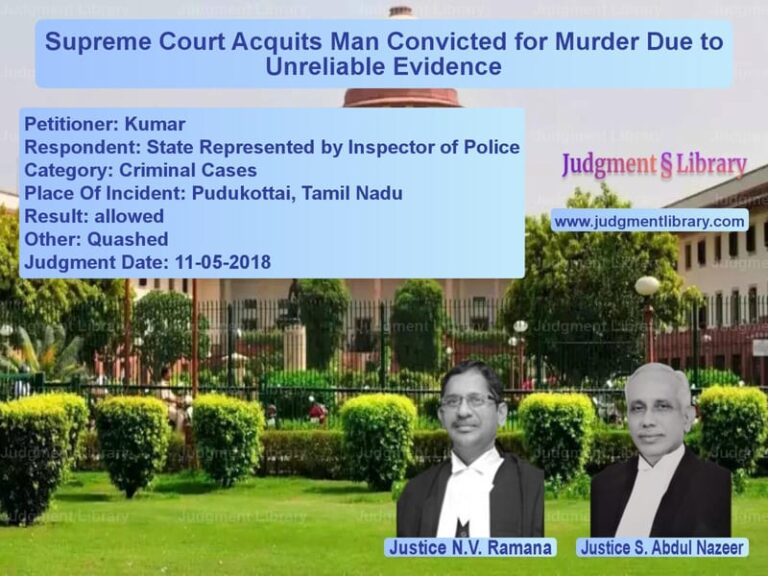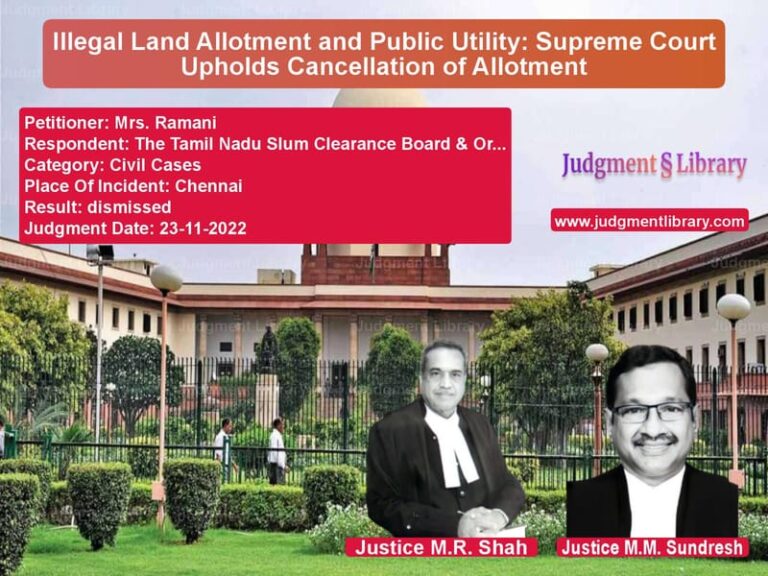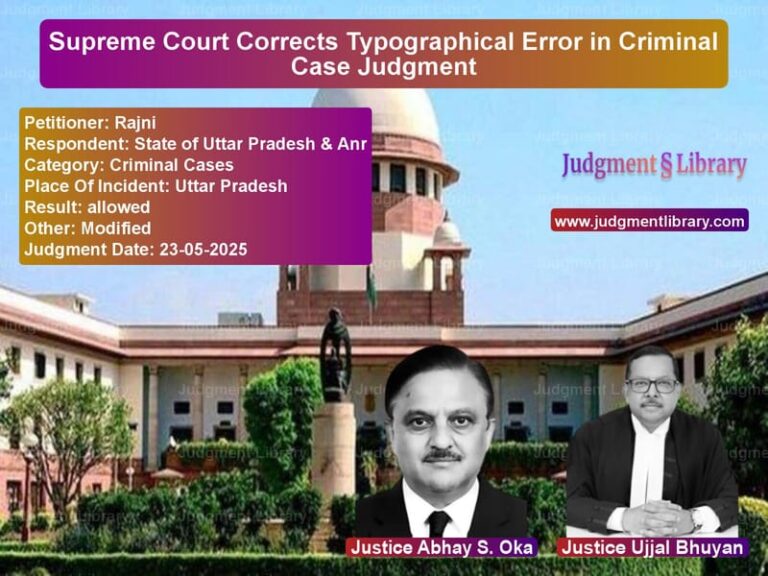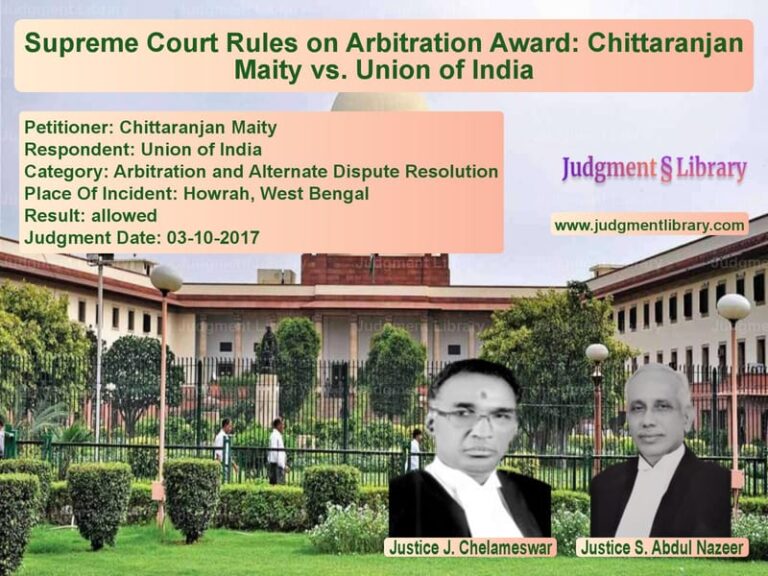Supreme Court Modifies Murder Conviction: Sentences Reduced to Culpable Homicide
The Supreme Court of India, in the case of Sunil @ Sonu & Ors. vs. State NCT of Delhi, has modified the conviction of the appellants from Section 302 (Murder) of the Indian Penal Code (IPC) to Section 304 Part-I (Culpable Homicide Not Amounting to Murder). The judgment, delivered on September 24, 2024, considered multiple legal and factual discrepancies, particularly the delay in FIR registration, contradictions in witness testimonies, and injuries sustained by the accused that were not explained by the prosecution.
Background of the Case
The case originated from an altercation on November 28, 2016, in Jahangir Puri, Delhi, where the accused allegedly attacked the deceased, Sachin, along with Rahul (PW-1). The prosecution claimed that the accused Sunil @ Sonu (A-1) and Nitin @ Devender (A-4) inflicted fatal knife wounds on Sachin, leading to his death on December 2, 2016. The case was registered under FIR No. 667 of 2016 at P.S. Jahangir Puri.
Key Legal Issues
- Was the delay in filing the FIR justified?
- Did the prosecution establish beyond reasonable doubt that the accused acted with premeditation?
- Were the injuries sustained by the accused adequately explained?
- Did the case meet the criteria for murder under Section 302 IPC?
Arguments by the Appellants
The appellants, represented by senior counsel, argued that:
- There was an unexplained delay of more than 24 hours in lodging the FIR.
- Rahul (PW-1), the prosecution’s key witness, gave contradictory statements regarding his presence at the crime scene.
- There was a cross FIR (No. 664 of 2016) filed by Sunil @ Sonu on the same day, alleging that Sachin and Rahul were the aggressors.
- The accused sustained injuries during the altercation, which were not explained by the prosecution.
Arguments by the Respondents
The State countered by arguing that:
- Multiple witnesses, including PW-1 (Rahul) and PW-2 (Shivani), confirmed the accused’s involvement.
- The medical evidence supported the prosecution’s case.
- The accused acted in furtherance of a common intention, justifying the conviction under Section 302 IPC.
Supreme Court’s Observations
1. Delay in FIR Registration
The Court found the delay in filing the FIR significant and inadequately explained:
“The delay of more than 24 hours in lodging the FIR raises doubts about the prosecution’s version of events.”
2. Contradictions in Witness Testimonies
The Court noted inconsistencies in the statements of PW-1 (Rahul) and PW-2 (Shivani), particularly regarding the sequence of events.
“The prosecution’s key witnesses provided conflicting accounts of the altercation, making it difficult to establish the accused’s guilt beyond reasonable doubt.”
3. Injuries Sustained by the Accused
The accused presented medical records confirming injuries, including incised wounds and abrasions, which were not accounted for by the prosecution.
“The failure of the prosecution to explain the injuries sustained by the accused casts doubt on the actual sequence of events.”
4. Absence of Premeditation
The Court ruled that the altercation appeared to be a sudden fight rather than a premeditated act:
“There is no evidence to establish premeditation or that the accused took undue advantage or acted in a cruel or unusual manner.”
Final Judgment
The Supreme Court modified the conviction as follows:
“Instead of Section 302 IPC, the appellants are convicted under Section 304 Part-I IPC. The appellants are sentenced to the period already undergone and are directed to be released forthwith if not required in any other case.”
Impact of the Judgment
This ruling has significant implications for criminal jurisprudence:
- Delay in FIR registration can weaken the prosecution’s case.
- Contradictions in witness testimonies can impact the reliability of evidence.
- Unexplained injuries sustained by the accused must be accounted for in trials.
- Absence of premeditation can lead to a lesser charge of culpable homicide.
The ruling reinforces the principle that convictions must be based on clear, unambiguous evidence and ensures that individuals are not wrongfully convicted based on weak or circumstantial evidence.
Petitioner Name: Sunil @ Sonu & Ors..Respondent Name: State NCT of Delhi.Judgment By: Justice B.R. Gavai, Justice K.V. Viswanathan.Place Of Incident: Jahangir Puri, Delhi.Judgment Date: 24-09-2024.
Don’t miss out on the full details! Download the complete judgment in PDF format below and gain valuable insights instantly!
Download Judgment: sunil-@-sonu-&-ors.-vs-state-nct-of-delhi-supreme-court-of-india-judgment-dated-24-09-2024.pdf
Directly Download Judgment: Directly download this Judgment
See all petitions in Murder Cases
See all petitions in Bail and Anticipatory Bail
See all petitions in Fraud and Forgery
See all petitions in SC/ST Act Case
See all petitions in Judgment by B R Gavai
See all petitions in Judgment by K.V. Viswanathan
See all petitions in partially allowed
See all petitions in Modified
See all petitions in supreme court of India judgments September 2024
See all petitions in 2024 judgments
See all posts in Criminal Cases Category
See all allowed petitions in Criminal Cases Category
See all Dismissed petitions in Criminal Cases Category
See all partially allowed petitions in Criminal Cases Category







